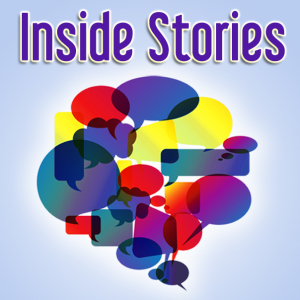 Annie Robinson (52 Posts)
Annie Robinson (52 Posts)Curator of Inside Stories and in-Training Staff Member
Columbia University
Annie Robinson completed a Master of Science in Narrative Medicine at Columbia University in 2014. She previously studied the healing power of stories as an undergraduate at NYU’s Gallatin School of Individualized Study.
Annie works as Narrative Coaching Specialist with Eating Disorder Recovery Specialists, helping individuals in the early stages of eating disorder recovery through mindfulness, meditation, yoga, and narrative practices. She is also the Program Officer at Health Story Collaborative, a non-profit that creates forums for individuals to tell their stories of personal health challenges, and curates another oral narratives projects called On the Road to Recovered: Voices from the Eating Disorder Recovery Community.
Annie is a coordinator and full-spectrum doula for The Doula Project in New York City, providing compassionate care for women during experiences of abortion, miscarriage, and fetal loss.
As a yoga teacher, writer, educator, and co-founder of NYC-based wellness community Pause, Breathe, and Connect, Annie shares her passion for integrative approaches to wellbeing. She is dedicated to creating spaces for people to explore the healing potential of interweaving of stories, spirituality, and somatic experience.
Inside Stories
Inside Stories is an oral narratives project which invites medical students to share their experiences in medical school in the form of brief podcasts published and archived on in-Training. The project aims to provide a means of personal healing, self-realization and empowerment through the sharing and receiving of personal stories, as well as to cultivate community among students in the often isolating medical school environment. The title Inside Stories reflects the project's mission to encourage students to go inside themselves and bring forth things that often go unspoken. It also represents the inside look listeners are granted into the sometimes private, challenging and confusing experiences students may have.
Made possible in part by a grant from the Arnold P. Gold Foundation and FJC.


How can doctors-in-training get the support they need to get through difficult personal experiences? Mia, a fourth-year medical student from Pennsylvania who intends to become a hematologist, describes the devastating situation she endured when her best friend died during her second year in medical school. She also comments on the complications of treating people in hematology.
How can doctors-in-training not lose touch with the importance of forming relationships with patients as they continue in their training? Sasha, a fourth-year medical student who plans to go into neurology, expresses her concerns about sustaining an ideal model of patient care. She also shares how she deals with the emotions that practicing medicine triggers.
How can doctors-in-training allow their personal experiences with loss and death to inform how they practice medicine? John, a fourth-year medical student in Philadelphia intending to become a psychiatrist, reflects on how his father’s long-drawn demise from Alzheimer’s influenced him.
How can doctors-in-training honor a patient’s experience as unique and significant, even as they become accustomed to witnessing suffering? Katie, a third-year medical student in New York who also holds a MFA in oil painting, shares some of the worries and questions she is grappling with on rotations.
How can doctors-in-training learn to relate to their patients in order to practice humanistic medicine? Aryanna, a fourth-year medical student in Texas going into family medicine, remembers a patient who showed her how much she could offer beyond physical medicine. She also reflects on how her multi-ethnic identity has influenced her journey in health care.
How can doctors-in-training act in accordance with their values through the challenging medical school experience? Bit, a first-year medical student with a background in positive psychology and an interest in studying empathy in clinical contexts, describes how she entered medical school with skepticism, yet has found ways to maintain her commitment to compassion.
How can doctors-in-training help each other remember what an honor it is to be a doctor? Joseph, a fourth-year medical student at Rush Medical College who hopes to enter a pediatric residency with a public policy focus and to pursue a hematology-oncology fellowship, shares his reflections after attending this year’s Gold Humanism Honor Society Biennial National Conference in Atlanta. He discusses changes that can be made to bring humanism to the fore in medical practice, and offers advice for others wishing to do the same.
How can doctors-in-training actually practice medicine “narratively”? Daniel, a fourth-year medical student applying in pediatrics and a graduate of Columbia University’s Master of Science Program in Narrative Medicine, grapples with how to humanize the practice of medicine, especially while up against the limitations of effecting change as a medical student. He concludes with a poignant personal story about an unexpected encounter with a former patient on the streets of New York City.
How can doctors-in-training honor the voices of their patients, especially children’s voices? Trisha, a first-year medical student who aspires to become a pediatric oncologist, discusses her mission to give children with cancer the opportunity to be heard. She describes a project she developed inviting children to tell the stories of their illness, which she compiled into her book, “Chronicling Childhood Cancer: A Collection of Personal Stories by Children and Teens with Cancer,” that was published this month in honor of National Childhood Cancer Awareness Month.
How can doctors-in-training allow patients to directly contribute to their learning process? Laura, a second-year medical student pursuing dual medical and social science degrees, describes how, by asking her patients to walk her through their embodied experiences, she gains knowledge she cannot learn from textbooks. She also shares the joy she feels in serving not only as a diagnostician, but also as a guide through major life transitions.
How can doctors-in-training allow their personal experiences with the health care system shape their own practice? Kalla, a second-year medical student in New York, describes how witnessing her father benefit from the addition of meditation and acupuncture to his cancer treatment inspired her to incorporate an integrative approach to her own self-care and future practice.
How can doctors-in-training frame their attitudes about the challenges of medical school to make it a nourishing and enjoyable process? Sonali, a second-year medical student in New York, describes how the teachings she learned from her Hindu Vedanta tradition about selfless service — also known as “karma yoga” — influence her approach to medical school.
 Annie Robinson (52 Posts)
Annie Robinson (52 Posts)Curator of Inside Stories and in-Training Staff Member
Columbia University
Annie Robinson completed a Master of Science in Narrative Medicine at Columbia University in 2014. She previously studied the healing power of stories as an undergraduate at NYU’s Gallatin School of Individualized Study.
Annie works as Narrative Coaching Specialist with Eating Disorder Recovery Specialists, helping individuals in the early stages of eating disorder recovery through mindfulness, meditation, yoga, and narrative practices. She is also the Program Officer at Health Story Collaborative, a non-profit that creates forums for individuals to tell their stories of personal health challenges, and curates another oral narratives projects called On the Road to Recovered: Voices from the Eating Disorder Recovery Community.
Annie is a coordinator and full-spectrum doula for The Doula Project in New York City, providing compassionate care for women during experiences of abortion, miscarriage, and fetal loss.
As a yoga teacher, writer, educator, and co-founder of NYC-based wellness community Pause, Breathe, and Connect, Annie shares her passion for integrative approaches to wellbeing. She is dedicated to creating spaces for people to explore the healing potential of interweaving of stories, spirituality, and somatic experience.
Inside Stories
Inside Stories is an oral narratives project which invites medical students to share their experiences in medical school in the form of brief podcasts published and archived on in-Training. The project aims to provide a means of personal healing, self-realization and empowerment through the sharing and receiving of personal stories, as well as to cultivate community among students in the often isolating medical school environment. The title Inside Stories reflects the project's mission to encourage students to go inside themselves and bring forth things that often go unspoken. It also represents the inside look listeners are granted into the sometimes private, challenging and confusing experiences students may have.
Made possible in part by a grant from the Arnold P. Gold Foundation and FJC.





